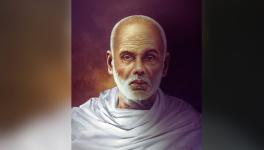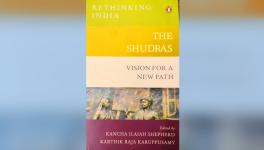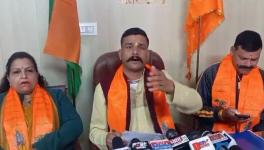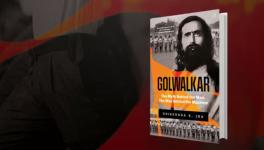Is Narendra Modi Suffering From 'Panic Disorder’?
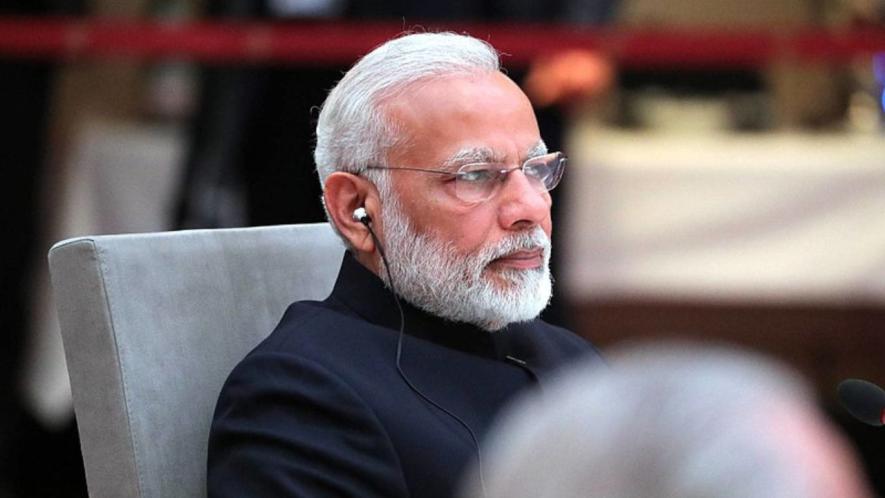
Image Courtesy: Wikimedia Commons
Two months ago, the incident of 'paaye lagi' (feet-touching) of Prime Minister Narendra Modi by Bihar Chief Minister Nitish Kumar added some spice to the country’s political scenario. A journalist friend from Patna, while talking on the issue, had then made an observation that Nitish Kumar, leader of the Janata Dal -United (JD-U), was very unpredictable. He said it could not be ruled out that Kumar was actually trying to pull the rug from under Modi’s feet.
Of late, while observing Modi, one willy nilly tends to concede that the journalist friend from Patna wasn't entirely wrong. Modi was not really comfortable with his allies in the National Democratic Alliance (NDA). Not only Nitish Kumar, he seemed anxious about Chirag Paswan of Lok Jan Shakti Party (Ram Vilas), a party with hardly five MPs from Bihar. Chirag is the son of Bihar’s popular Harijan leader, late Ram Vilas Paswan. Many voters of Hajipur, the electoral constituency of Ram Vilas Paswan, were heard saying, “Upar me aasman, niche Paswan’ meaning thereby that underneath the sky of Hajipur, there stands only Paswan, no one else.
Chirag, who named the party after his late father (the original was Lok Janshakti Party), had declared himself as a ‘Modibhakt Hanuman’ (Hanuman, the Modi disciple). Recently, Chirag, who is yet to complete preliminary lessons in politics, also made hissing sounds while opposing lateral entry in the higher echelons of administration in the Central government. PM Modi rolled back the relevant notification just after five days of its promulgation.
Incidentally, it was Leader of Opposition Rahul Gandhi who first brought the issue to the attention of the country by opposing the move on social media. Nitish's JD-U also raised objections about the notification. There are no such precedents in the previous two governments led by Modi. In his third innings, Modi looks calm and restrained and has already set a few precedents in accommodating the views of the NDA partners as well as the Opposition, even backtracking some of his wrong decisions.
Modi has, in the immediate past, gone on reverse gear on more than one issue. His government imposed a new capital gains tax rule in the Union budget, but had to amend the same in the face of opposition. Also, the Information and Broadcasting Ministry had to withdraw the draft Bill prepared on Broadcast Services (Regulation) which had several proposals for muzzling “anti-government” media.
The Modi government is also not trying to go ahead forcefully on Wakf Bill and has agreed to send the same to a parliamentary committee. The Bill allegedly has scope for intervention of the government as also non-Muslims in Wakf properties. Recall that it is this very government that refused to refer the Bill on ban on Teen Talaq to a parliamentary committee.
Last week, during the course of a meeting of the parliamentary committee regarding OBC (Other Backward Classes) matters, when two Congress MPs demanded a discussion on caste census, the JD-U representative supported them. The chairman of the committee, the BJP MP from Satna in Madhya Pradesh, didn’t refuse the request.
The third term of Modi government hasn't crossed three months as yet. The rollback on several issues within such a short period indicates a ‘panic disorder’ or a ‘frightened state’ of the entire Central ministry, although there appears no serious crisis before the government that should make it suffer from any phobia.
In 1999, the NDA government headed by Atal Bihari Vajpayee was short of 90 seats from the minimum of 272 seats required for an absolute majority, whereas in Modi's third regime, the Bharatiya Janata party (BJP) is only 32 seats short of a single party's absolute majority mark. However, BJP has more (240) seats than the total number of seats (235) bagged by the Opposition INDIA bloc. Moreover, NDA has only recently regained a majority in Rajya Sabha.
Despite this, Modi has stepped back on more than one Bill or decisions in the face of opposition. Not only that, he has virtually brought back the Old Pension Scheme in the garb of the Unified Pension Scheme for Central government employees, keeping in view BJP’s election prospects in four states slated for Assembly elections. He has bid adieu to the National Pension Scheme introduced by the Vajpayee government with effect from January 2004.
It may be mentioned that the Vajpayee government had to pass through many crises on the question of parliamentary majority. He had to take into account the demands of regional leaders, such as Tamil Nadu’s J Jayalalithaa and Mamata Banerjee in West Bengal. The greatest difficulty was that veteran BJP leaders like Vajpayee and L K Advani could never utter a word about their party's own agenda due to opposition from their alliance partners. In spite of that, there was no visible inkling of worry on the faces of those two leaders.
On the other hand, Modi is running an alliance government when the Ram Mandir in Ayodhya has already been built and inaugurated after settlement of the Mandir-Masjid dispute in the highest court of the land. The second Modi government abrogated Article 370 of the Constitution and removed the clause giving special status to Jammu and Kashmir. NDA allies did not raise any objection. The anti-Teen Talaq law is as good as enforcing a uniform civil code. All this means that Modi is heading a coalition government dependent on allies' support at a time when he has already implemented almost all the core agendas of Rashtriya Swayamsevak Sangh (RSS) and BJP.
Why then does the Prime Minister look perplexed? His demagogic tone in meetings and programmes is missing. One reason could be that he lacks experience in running a coalition government. Vajpayee and Advani did not only administer coalition governments, their political journey adhered to coalition politics. Both the leaders didn't have the experience of becoming Chief Minister, which Modi has. Modi didn't need to sweat a bit to become the Gujarat Chief Minister, not even for being chosen as the Prime Minister aspirant in BJP. Moreover, as a result of BJP acquiring 300+ seats on its own, Modi had started thinking that the entire nation is Gujarat.
The main reason for Modi's increasing anxiety is different now. He seems afraid of Congress leader Rahul Gandhi and the INDIA bloc. He was clearly perturbed by the first speech of Rahul Gandhi in Parliament as the new Leader of the Opposition when he held up a portrait of Lord Shiva and set a new narrative against Hindutva. Modi looked baffled by Rahul Gandhi's attack on BJP, using a Hindutva weapon.
In 2017, soon after assuming the office of Congress president, Rahul Gandhi had adopted the path of ‘soft Hindutva’. Visiting temples and praying in public were part of his political activities. That Rahul Gandhi couldn't be distinguished from the meditating Narendra Modi or the Sadhus and Sants of Karsevakpuram in Ayodhya.
But Rahul Gandhi is now going ahead with his third tactic. His second tactic was Bharat Jodo Yatra (Walk to Unite India), through which the Congress leader appears to have been able to contain, to a certain extent, the hyper-nationalism of BJP through his message of a plural and united India. He is now trying to make inroads into the vote bank of the saffron brigade built through so-called Hindu unity.
BJP, known as the party of the upper castes from the time of Vajpayee-Advani, has never made secret its intention of amalgamating into its fold the Dalits, Scheduled Tribes and OBCs. Otherwise, the Lotus (BJP’s election symbol) brigade couldn't have grabbed power in state after state. In a state like Uttar Pradesh, Yogi Adityanath is the first Chief Minister to have come back to power consecutively for the second time. It's BJP during whose regime a tribal community leader is now the President of the country and an OBC, the Prime Minister.
However, it has become quite apparent to citizens in the preceding 10 years, that BJP's love for Dalits, STs and OBCs is actually a sham. The way the Modi government’s policies as regards industry and commerce have been instrumental in destroying nature, makes it abundantly clear that this political force can, in no way, be termed as friends of the vanvasis (forest folk) and tribal communities. The list of beneficiaries of the Union government clearly indicates that the Modi-Amit Shah government is a friend of the corporate world.
Rahul Gandhi has consistently kept himself engaged in exposing BJP, which is indirectly bridging Congress with Modi's coalition partners. On issues such as interests of Dalits and backward classes, caste census etc., all the parties, save the Trinamool Congress, are with the Congress. More importantly, a majority of Modi’s alliance partners are in agreement with the demands of Congress on the aforesaid issues.
Congress or its partners in the INDIA bloc, as of now, seem to have no desire to topple the Modi government by engineering defection of NDA allies. But the Modi-Shah duo seem afraid of the way their alliance partners have started throwing their weight behind issues being championed by Rahul Gandhi. BJP leader Smriti Irani, probably foreseeing such a situation, has started saying that Rahul Gandhi can no longer be ignored or lampooned as ‘Pappu’.
In such a critical situation, the Modi-Shah duo find themselves endangered due to their past deeds or rather misdeeds. During the Vajpayee-Advani era, there were BJP stalwarts like Sushma Swaraj, Arun Jaitley and Pramod Mahajan. Among partners was George Fernandes, who was anointed by BJP as NDA convenor. During any crisis, these leaders used to patiently lend their ears to their allies as well as Opposition leaders. Under Modi-Shah's BJP, there is none of their kind. Although Rajnath Singh and Nitin Gadkari are there, they have never been accorded the dignity they deserve, nor have they been entrusted with any commensurate responsibility.
The writer is Executive Editor, The Wall, and former Senior Editor, Times of India. The views are personal.
Get the latest reports & analysis with people's perspective on Protests, movements & deep analytical videos, discussions of the current affairs in your Telegram app. Subscribe to NewsClick's Telegram channel & get Real-Time updates on stories, as they get published on our website.











